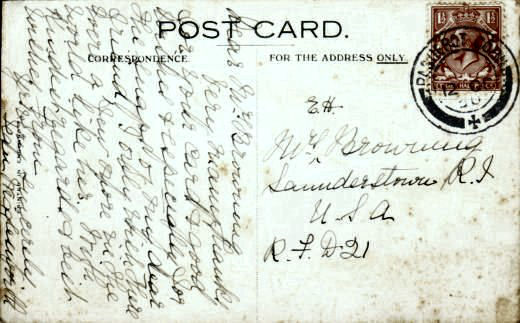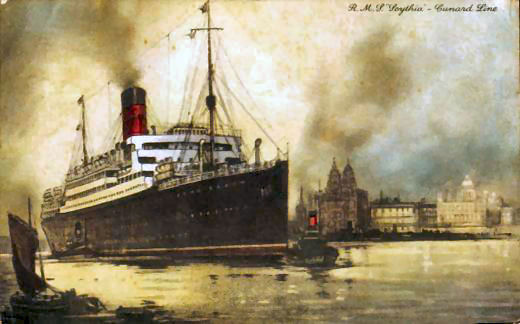![]()
Postal History Introduction
Stampless
Covers
1846
to 1900 Issues
1901-1950
Issues
1951-2003
Issues
Cancels
&
Miscellaneous
Postal
Stationery
Post
Cards
Air
Mail
First
Day &
Event Covers
Parcel Post/Special Delivery
Registered & Official Mail
Commercial & Advertising
Revenue & Postage Due
Wildlife & Game Issues
Complete List of RI Issues
|
Rhode Island
Paquebot and Sea Post Mail |
|
|
|
|
Face of Card shows
RMS Scythia leaving Cobh, County Cork, Ireland. |
|
|
|
|
SS Scythia SS Scythia was built by Vickers Limited at Barrow-in-Furness, launched on March 3, 1920 and made her first voyage for the Cunard Line on August 20, 1921. She sailed the Trans-Atlantic route between Liverpool and New York from 1921 to 1939, however in 1939 she was requisitioned by the government and converted to carry troops in which capacity she served until 1946. Scythia was struck by an aerial torpedo on November 23, 1943 and sank at her berth. She was pumped out and given a temporary patch in December and sent to New York in January 1943 for a full refit. In April of 1946 Scythia transported 2,500 German prisoners from Canada to England. and in 1948 she was chartered by the International Refugee Organization to carry refugees from Germany to Canada. Scythia underwent a 9 month refit beginning in November 1949 at the John Brown Shipyard and then returned to regular service. She was involved in a collision with the steamer Wabana in the St. Lawrence Seaway on June 5, 1952. SS Scythia made her final voyage in December of 1957 and was retired from active service. She was scrapped in 1958. As originally configured the Scythia had an overall length of 657 feet and a beam of 73.8 feet. She displaced 19,730 tons and had a top speed of 16 knots. She could accommodate a total of 2,200 passengers, (350 in First Class, 350 in Second Class and 1500 in Third Class). Cobh, (or Queenstown) was the last Port-Of-Call for Cunard Liners before crossing the Atlantic to the west. It was the last port that the Titanic saw before she hit the iceberg and the Lusitania was on her way there, when she was sunk by the German U-Boat. Paquebot Markings Paquebot Cancels were applied by Shore Post Offices for mail received from ships that had no post office onboard. The postcard illustrated above was most likely written and posted, (given to the purser or steward) aboard the RMS Scythia on her run between Liverpool and Cobh. It was then dropped off by the ship when they arrived at Cobh, where it received the Paquebot cancel. NOTE: Mail posted at sea on ships that had an onboard post office was marked "Seapost." Paquebot markings (French for Packet Boat - French being the language used by the Universal Postal Union - UPU) were first used in 1894 by Great Britain to cover loose mail received from ships without onboard post offices; many of these with uncanceled foreign stamps on the cover. Paquebot cancels were applied to the mail by the post office at the port of arrival. The UPU had been considering ways to handle this type of mail since 1891 and in 1897 "Paquebot" was officially adopted by the UPU for use on international mail received at ports from ships at sea. Paquebot markings had their heyday from the late nineteenth century to the mid twentieth century. Almost all of the modern Paquebot markings, (1970's and newer) were created for philatelic usage and as far as I'm concerned; they are not a desirable collectable. John W. Browning was born on January 21, 1910 in Providence, Rhode Island. He died on March 16, 1992 in Providence. He was the son of Augustus and Theresa Browning. John's father is listed as a Brakeman for the Railroad. An interesting side note is that John's mother, Theresa is listed as "Swedish" and having been born at sea. I'm not sure what John was doing in Saunderstown in December 1930, There isn't much going on there during the winter months. The message text on the postcard's reverse reads as follows:
Dear J. W. Browning, |
![]()
RI Historical
Society
The Post Offices
Home Page
RI Tercentenary Issue History
RI Philatelic Society
Recently Added Pages
Philatelic Primer
Rhode Island Around the World
Rhode Island
Town Postmarks
Other Websites of Interest
Return to
Saunderstown
Thumbnail Page part 2
OR
Return to Paquebot
Thumbnail Page

